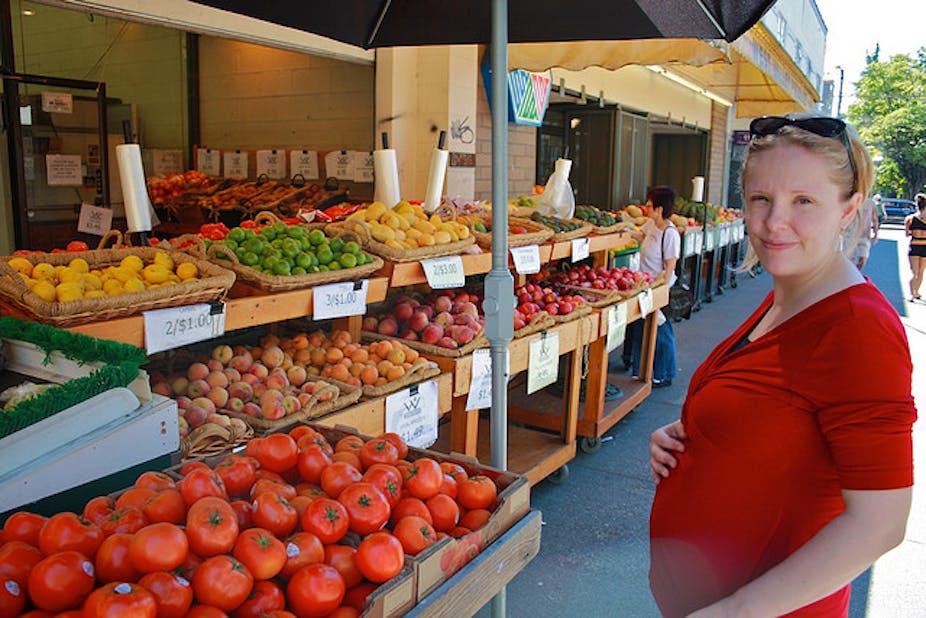If you’ve ever been pregnant, you’ll know what it’s like to be bombarded with mixed messages from well-meaning friends and family about what you should eat and avoid to protect your growing baby.
It can be difficult to separate myth from reality but ultimately, the advice is very simple: eat as usual with a few small, but important, exceptions.
Variety
A balanced diet during pregnancy will include an increase in some vitamins, nutrients and minerals.
As a guide, try for the following each day:
4 to 6 serves of breads/cereals, rice, noodles, pasta (one serve equals two slices of bread, one cup of cooked rice/pasta/noodles, half a cup of muesli)
5 to 6 serves of vegetables and legumes (one serve equals one cup of salad, half a cup of vegetables/cooked beans/lentils);
4 serves of fruit (one serve equals one medium-sized piece of fruit, one cup of canned fruit, four dried apricots);
1½ serves of protein (cooked meat, eggs and nuts are the best source for pregnant women); and
2 serves of calcium (250ml milk, 2 slices of cheese or 200g yoghurt).
Most women don’t need to increase their dietary intake of protein, carbohydrates or fats.
Vitamin supplements
Most women will get all the extra vitamins, nutrients and minerals needed for pregnancy through their diet, with the exception of folate, a B-group vitamin (also known as folic acid).
Some breads, breakfast cereals and fruit juices sold in Australia contain folic acid but most women still don’t get enough.
There is strong evidence to suggest that folate supplementation prior to conception and in the first trimester of pregnancy will prevent abnormalities with the baby’s nervous system.
A daily dose of 500 micrograms of folate is recommended one month before conception and for the first 12 weeks of pregnancy.
Getting enough omega 3 is also important to assist in the development and growth of a baby’s nervous system. Salmon, trout, herring anchovies, sardines and canned tuna are good sources of omega 3.
The growing baby requires calcium for the development and strengthening of its bones. The calcium in foods such as hard cheese, milk and yoghurt should be enough to meet both the mother and her baby’s needs.
Finally, most women will have a normal drop in iron stores later in the second trimester – this is often detected through a blood test.
The effects from this drop in iron may include lethargy, dizziness and sometimes even fatigue or fainting. To lessen the effects, try to eat cooked lean red meat (the best source of iron), green leafy vegetables or cooked legumes such as chick peas.
Remember, consuming vitamin C through natural products such as fresh orange juice increases the absorption of iron, while caffeine and dairy products can interfere with absorption.
If you’re unable to consume the recommended intake of these vitamins, nutrients and minerals then you may need to consider a supplement. But it’s important to do this in consultation with your health-care provider.
Heartburn
Heartburn is common in pregnancy, especially in the later months when the weight of the baby is pressing on the stomach.
Antacids can sometimes relieve heartburn but use them cautiously, as they can exacerbate reflux and cause further heartburn.
Dairy products act as natural antacid and will ease heartburn.
Nausea
In early pregnancy (and all the way through for some) nausea or vomiting can interfere with your appetite. It will usually ease around the twelfth week but until then, ginger products and small bland snacks such as crackers may alleviate hunger.
Dehydration contributes to nausea and vomiting so it’s important to drink to your thirst.
Things to avoid
It’s best to avoid processed or uncooked meat and fish. Ham, salami, sushi, pate, soft cheeses (such as camembert and brie), cold take-away barbeque chicken and ready-to-eat chilled peeled prawns all have the potential to grow bacteria that could be harmful in pregnancy.
Listeria, an illness caused by the bacteria Listeria monocytogenes, is particularly dangerous for pregnant women and can cause miscarriage, premature birth and stillbirth.
Similarly, pre-packaged salads, fruit salad and sprouts may also be contaminated with bacteria, such as listeria, and should be avoided.
It’s safe to prepare your own sushi (with cooked fish) or eat freshly cooked barbequed chicken while it’s still hot.
Healthy weight gain
Pregnant women should eat to their appetite and enjoy a variety of freshly washed, cooked and prepared foods.
There is no need to “eat for two” or drink full fat milk. If you feel hungrier, some extra serves of fruit and vegetables and healthy snacks should be enough.
A woman’s recommended pregnancy weight gain is based on her pre-pregnant weight, with overweight and obese women requiring only a modest weight gain.
Most women with a normal body mass index should gain between 12 to 18 kilograms during pregnancy.
With this type of healthy weight gain, extra intake of proteins, carbohydrates, fat or supplementation of vitamins and minerals (aside from folate) is not required.
Have you been given any peculiar pregnancy diet advice? Share your comments below.

